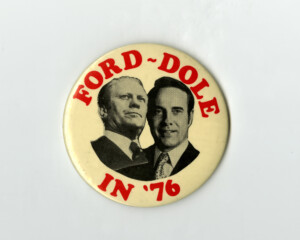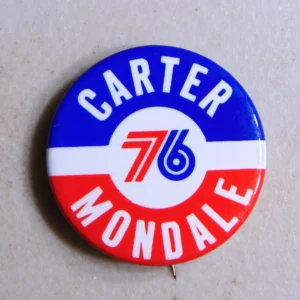The GOP convention convulses…in 1976!
It was not yet morning in America. Nor was it mourning in America. That had already happened, in 1963 (JFK), and in 1968 (MLK, RFK). Four years after Richard Nixon resigned the presidency in disgrace, President Ford had presided over a time of relative normalcy. Watergate was in the rear view mirror. The war in Vietnam had finally come to an ignominious end. Ford’s pardon of Nixon still rankled many. “The son of a bitch has pardoned the son of a bitch,” my colleague Carl Bernstein famously said. But Ford’s goal, as he himself said, was “to put this long national nightmare behind us.”
Still, home mortgage rates were close to 9 percent, and the inflation rate was 5.7 percent. Both were deemed politically unacceptable. The Ford administration came up with a slogan if not a plan: Whip Inflation Now. WIP was the acronym. There were even WIP buttons, which I added to my political items collection and still have. The Grand Old Party, or GOP, the party’s nickname since the 1870s, did not seem so grand at the time. Meanwhile, an unlikely fresh face emerged from Plains, Georgia, a plain-speaking peanut farmer and former governor named Jimmy Carter. Remarkably, he had secured the Democratic nomination in July.
Now, it was a month later when Republicans convened in Kansas City to choose their standard bearer. Ford, the accidental incumbent, had been Speaker of the House when Nixon tapped him for vice president after the resignation of VP Spiro Agnew, who had been on the take from his days as Baltimore County executive to the governorship of Maryland all the way into the vice presidency. He had been Nixon’s attack dog, replaced by the mild-mannered Ford.
At the Washington Post, my beat then was the District of Columbia, so I got to cover Jimmy’s (as everyone called him) campaign in the District’s Democratic primary, itself remarkable because city residents were already overwhelmingly Democratic and had little-to-no-impact on the national election. Jimmy’s mother, “Miss Lillian,” also campaigned for him there, and in Georgetown made a fuss over my then six-year old son Eric who was with me.
Republicans in the District of Columbia were a tiny minority of a minority: overwhelmingly white and almost exclusively from white Ward 3, west of Rock Creek Park, the city’s racial dividing line. The Republican delegation reflected this divide: Only six of the 14-member delegates were Black.
But the D.C. delegation had an outsized role. Virginia Morris, a former DC school board president, called the convention to order and was secretary of the rules committee, a key position. Audrey Rowe Colom, an alternate, introduced Vice-President Nelson Rockefeller and was among those chosen to ecort Ford to the podium. Robert S. Carter, D.C. Republican National Committeeman, addressed the convention as co-chairman of the Republican National Committee, The D.C. delegates included Michael Doud Gill, a nephew of Dwight D. Eisenhower, and Henry A. Berliner, Jr.. the delegation chairman, whose grandfather, a German Jewish immigrant, had invented the flat disc phonograph record.
The delegation had some of the best seats in the Kemper Arena, 18 center rows back from the podium. It was housed right across the Missouri River, within minutes of the arena, while some large delegations were lodged 20 or more miles from downtown Kansas City. I billeted with the District delegation, in the same motel as Bob Dole, the Kansas senator and wounded WWII vet who would have unfulfilled presidential aspirations but would become a beloved national icon and live to the age of 98.
This Republican convention was in lockstep with nobody. There was no cult figure to command the party’s base, a word which hadn’t yet been used.
There would be no rubber stamp. There would be no coronation.
Instead, I got to witness an exciting unscripted party contest on the convention floor. Ronald Reagan, the former B-grade movie actor and California governor, was challenging the presumptive nominee, Gerald Ford. He had a national persona with his post-Hollywood speech at the 1964 Republican convention, as a TV spokesman for General Electric, and from his two terms as governor of California. He challenged Ford in the 1976 primaries, but neither came to the convention with the majority of delegates needed for the nomination. Then the conservative Reagan made a dramatic move: He announced that his running mate would be the moderate Republican senator from Pennsylvania, Richard Schweiker.
Ford narrowly won a majority of delegates and chose Dole as his running mate. It was a losing ticket. Dole would later be the party’s nominee in 1996 opposing President Bill Clinton and lose to him in an Electoral College landslide. I interviewed Dole once during that campaign. We were seatmates on a short flight from Baltimore to Maryland’s Eastern Shore where he toured a Purdue chicken plan, and I found him affable and candid.
Kansas City was by then two decades in the past. But, now 48 years later, my memories remain vivid, of a raucous, democratic (small d) convention, divided but not polarized, with no hidden agenda and no plan to “Make America Great Again.” The country, in my view, despite its deep historic and contemporary flaws, was already great, full of possibilities and, in Kansas City in 1976 some of the best prime rib steaks I’ve ever eaten before or since.

Not a winning GOP ticket in 1976

The peanut farmer and Minnesota senator, a winning ticket in 1976
Excellent. Thanks.
Very nice. Times have changed, but it is a good idea to remind people of how conventions were.
Several random thoughts: Jimmy Carter was the first person I ever voted for, and I voted for him because he was a good person. He is a good person. I liked Nelson Rockefeller. I think I knew something about his NY politics. I didn’t like Reagan, ever, then or before or after. And that all seems so long ago, on the one hand, and when Trump went to Philadelphia Mississippi, a lot of it came back.
But mostly, thank you. As usual, very interesting.